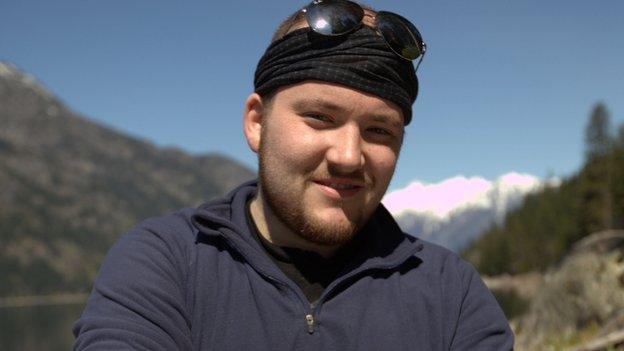Living with OCD
- Published

OCD is a term that many are familiar with on a passing level, but few understand the consequences that sufferers contend with.
Twenty-two-year-old Josh Cannings has suffered from symmetry OCD or obsessive compulsive disorder for nearly 10 years.
It is a condition that has had a massive effect on his day-to-day life, but one that is often trivialised by society.
"I have to touch everything with my left and right hands, my left and right feet an equal amount of times everywhere I go, 24/7. It's constant," says Cannings.
"So say I pick up a fork with my left hand I have to also touch it with my right hand the same amount of times.
"I shake hands with both hands clasping."
Cannings, who works as a chef in a restaurant, says if he does not "equalise" he gets a feeling of dread in his mind and to counteract that feeling has to continually obey his compulsions.
"It's that dread you get when you feel like something horrible has happened, when you find out a piece of extremely bad news, like someone you love is injured.
"It's that feeling of helplessness about not being able to do anything about it and obviously anxiety levels rise, you start sweating, you can feel your heart beating faster and you start breathing heavily."
People suffering from symmetry OCD often feel compelled to perform tasks in a symmetrical, orderly or balanced way. This can involve, for instance, aligning objects so that they feel right or as with Cannings, repeating the same action with each hand, foot or side of the body.
Cannings first noticed the symptoms of OCD when he was 12 years old and was playing in goal at a school football match. He had to touch the markings on the pitch with both feet and touch the ball with both hands, but it was only as he got older he started to realise that not everybody did this.
"The worst thing that I did was not talk to someone," says Cannings. "Just be open about it, it's not something to be ashamed of, everyone's going to struggle with mental health at some point in their lives."
The causes of OCD have not yet been identified and are widely debated within the research community. However it is thought genetic history, increased activity and blood flow in some parts of the brain and a lack of the chemical serotonin could play a part, along with environmental factors and life events.
It is estimated that 1.2% of the population in the UK have OCD, or 12 out of every 1,000 people, however these estimates might not tell the whole story. Many more may be suffering in silence.
"I sort of see OCD as mental health's lesser known cousin," says Cannings.
"Everybody sort of knows it, but not everybody knows what it actually involves. Not everybody knows how much it impacts people's lives."
Ashley Fulwood, chief executive of OCD-UK says the condition can be mentally and physically draining and can completely destroy a person's quality of life. Even so, it is often made light of by the uninformed.
"There are a lot of misconceptions about OCD, that it's just a little bit of handwash and a little bit of quirkiness. Unfortunately OCD sometimes can lead to very tragic consequences," says Fulwood.
"So every time a celebrity uses the term, 'I'm a bit OCD', it really just trivialises what is a most serious, devastating illness that completely consumes lives."
OCD can make life twice as hard and symptoms can vary from the mild to the severe.
Compulsions can be overt, or observable by others or covert, or unobservable, such as mental actions.

Cannings attended a therapy camp in America with other OCD sufferers
While the compulsive behaviour or rituals may take up hours of the day, some OCD sufferers can still go about their daily life, whereas others find the condition so incapacitating that they cannot work, study, have a social life or even leave the house.
For Cannings it can take double the amount of time to carry out a simple task, such as typing out a letter on a computer. On a recent trip to the cinema he accidentally brushed his left hand on the wall and, not wanting to draw too much attention to his compulsion, went home. He had to return an hour later.
"[I had] to get a taxi which cost me £25 just to go up to the cinema wall and touch it with my right hand. It's a bigger strain monetary-wise because I don't like getting public transport."
Treatment for OCD includes talking therapies such as cognitive behavioural therapy, medication and Exposure and Response Prevention (ERP), where a person is asked to confront their fears. Cannings attended a therapy camp in America which specialises in ERP and is aimed at helping young adults affected by OCD.
Before attending the camp, if Cannings touched something with his left hand he would have had to touch it with his right within a minute, or face an anxiety or panic attack, but the treatment process has extended this window to 30 minutes.
He is confident that this window will keep increasing with time, but believes OCD is not something that can be completely overcome.
"I think it's always going to be there in the background," says Cannings, "but I feel that the severity of it will go down in time."
With treatment, the outlook for OCD is good and symptoms can be reduced, but "cure" seems to be a word that is blacklisted among the OCD community, says Fulwood.
"My personal belief is that OCD can be treated. I have seen people completely recover from OCD to the point where they wouldn't even be diagnosed with OCD now," says Fulwood. "They can regain control of their lives."
Cannings says the important thing to remember as an OCD sufferer is you do not have to feel alone, there are other people that feel the same way as you.
Extreme OCD Camp will be broadcast on Tuesday 30 July at 21:00 BST on BBC Three
You can follow the Magazine on Twitter, external and on Facebook, external